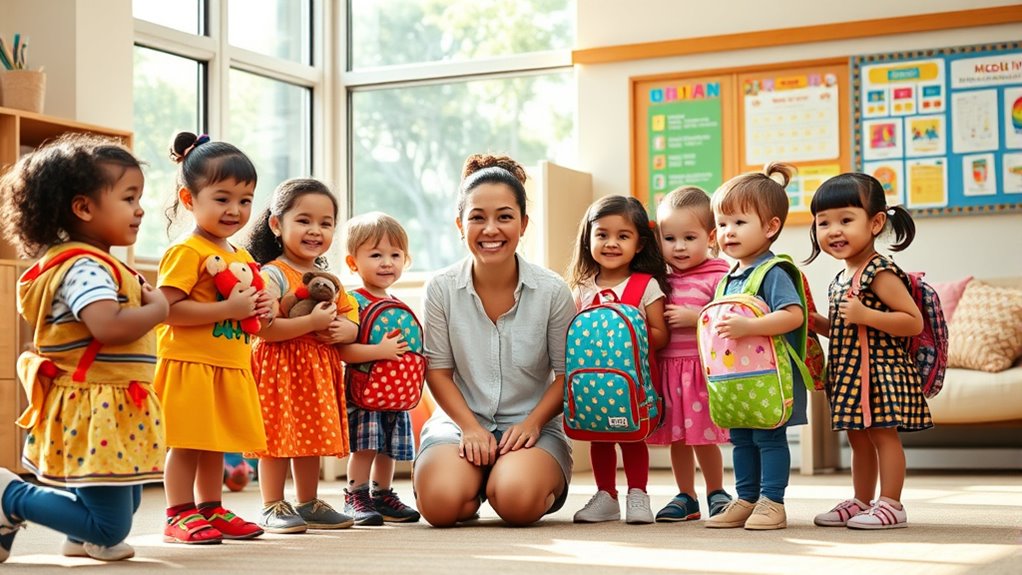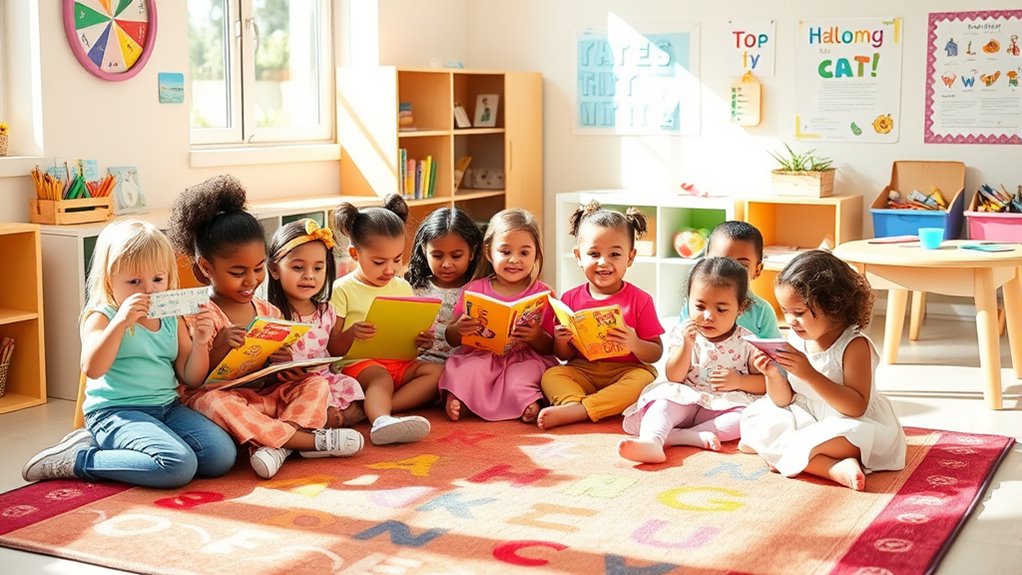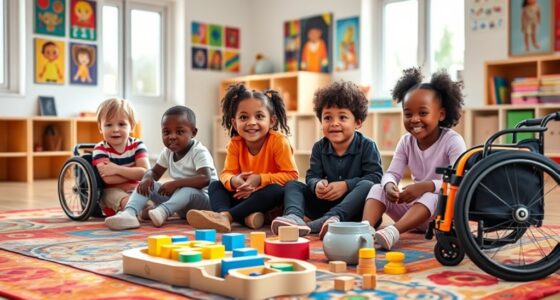To help your child smoothly shift to kindergarten, focus on establishing consistent routines like wake-up times and prepping their bag. Practice social skills, such as sharing, taking turns, and greeting others, to boost their confidence. Address any worries they have and celebrate small successes to build emotional readiness. Stay connected with teachers and use available resources to support their growth. Keep exploring these strategies to make their first school experience a positive one.
Key Takeaways
- Establish consistent daily routines to provide predictability and reduce anxiety about the new environment.
- Practice social skills like sharing, taking turns, and greeting to foster positive interactions.
- Prepare children emotionally by discussing expectations and addressing fears openly.
- Use role-play and modeling to reinforce social behaviors and communication strategies.
- Stay informed and maintain open communication with caregivers to support the child’s transition process.

Getting your child ready for kindergarten can be an exciting and rewarding process. It’s a time filled with anticipation, new experiences, and opportunities for growth. One of the first steps you can take is focusing on developing your child’s social skills. These are essential for helping your child build friendships, navigate group activities, and feel comfortable in a classroom setting. Encourage your child to share, take turns, and express their feelings clearly. Role-playing simple social situations can be incredibly effective, such as practicing greeting classmates, asking to join a game, or saying thank you. These interactions help your child understand social cues and develop confidence in social settings. As they learn to interact positively with others, they’ll find it easier to adapt to the social environment of kindergarten, making the shift smoother.
Helping your child develop social skills fosters confidence and eases their transition into kindergarten.
Alongside social skills, establishing a consistent routine is equally important. Children thrive on predictability, so creating a daily schedule that mimics what they’ll experience at school can ease anxiety and foster independence. Start by setting regular wake-up times, meal schedules, and bedtimes. Incorporate activities that mirror school routines, like packing a backpack, practicing putting on and taking off coats, or lining up for activities. This helps your child become familiar with the rhythm of a school day and reduces surprises that might cause stress. Consistency also helps your child feel secure, as they know what to expect and can prepare mentally for each part of the day. Making routines predictable and involving your child in planning them can boost their sense of control and confidence.
You can also establish simple routines around social interactions, such as practice greetings in the mirror or with family members. Encourage your child to initiate conversations, share their thoughts, and listen to others. These habits will serve them well in the classroom and help them form positive relationships with teachers and peers. Remember, children often learn best through repetition and modeling, so demonstrating patience, kindness, and good manners will reinforce these behaviors. Additionally, implementing mailing list strategies can help you stay informed about educational tips and resources to support your child’s development.
Finally, keep communication open with your child about what to expect and address any fears or concerns they may have. Reassure them that it’s normal to feel nervous and that they’ll make new friends and learn fun things. Celebrate their progress, no matter how small, and encourage a positive attitude toward new experiences. By focusing on building social skills and establishing routines, you lay a strong foundation for your child’s successful transition into kindergarten, making the experience enjoyable for both of you.
Frequently Asked Questions
How Can I Help My Child Develop Social Skills Before Kindergarten?
You can help your child develop social skills by arranging playdates where they interact with peers and practice sharing activities. Encourage your child to take turns, express their feelings, and listen to others. During playdates, guide them to resolve conflicts calmly and celebrate cooperative behavior. These experiences build confidence and teach essential social skills, making their progression into kindergarten smoother and more enjoyable.
What Are Signs My Child Is Ready for Kindergarten?
Think of your child as a budding plant, ready to bloom. Signs they’re ready include confidently playing on the playground, showing independence cues like dressing themselves, and expressing curiosity about new activities. If they seek out social interactions and can follow simple instructions, they’re likely prepared for kindergarten. These cues indicate they’re developing the necessary social skills and independence, making the progression smoother and more enjoyable for everyone involved.
How Can I Ease Separation Anxiety for My Child?
To ease your child’s separation anxiety, try using gradual separation techniques, starting with short periods apart and slowly increasing them. Incorporate play therapy to help your child express feelings and build trust. Stay positive and consistent, offering reassurance during goodbyes. Remember, patience is key; over time, your child will gain confidence and comfort being away from you, making the progression to kindergarten much smoother for both of you.
What Should I Do if My Child Is Reluctant to Attend?
If your child is reluctant to attend, try playdate strategies to build confidence and familiarity. Arrange short, positive visits with classmates to ease anxiety. Bring comfort objects to help them feel secure in the new environment. Talk openly about their feelings and listen carefully. Reassure them that it’s okay to feel nervous, and celebrate small successes to encourage a positive attitude towards kindergarten.
How Can I Support My Child’s Language Development at Home?
Like the wise owl from bedtime stories, you can boost your child’s language skills through storytelling techniques and interactive reading. Engage them in lively conversations, ask open-ended questions, and encourage them to retell stories in their words. Use expressive voices and gestures to make reading fun and memorable. These activities build vocabulary, comprehension, and confidence, laying a strong foundation for their language development and future learning adventures.
Conclusion
By following these tips, you set your child up for a successful kindergarten experience. For example, imagine a shy preschooler who, thanks to regular visits and social play, gradually gains confidence and starts making friends. With patience and preparation, you help your child feel secure and enthusiastic to learn. Remember, your support makes all the difference in turning the shift into an exciting new adventure rather than a stressful challenge.









